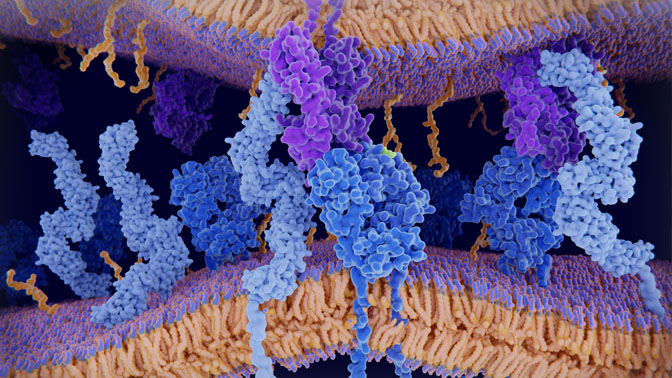
The adaptive immune system is the branch of the immune system that can learn from past threats and provide future immunity. Studying adaptive immunity is key to understanding how vaccines and immune-based therapies work.
The process of adaptive immunity involves two types of white blood cells known as T cells: T helper cells, which activate the immune system, and T killer cells, which seek out and kill threats.
Researchers currently study T killer cells using a type of protein known as the human leukocyte antigen (HLA), which binds strongly to these cells and tags them so that they can be observed and tracked.
However, HLA only weakly binds to T helper cells. “The extremely weak binding between HLA and T helper cells limits our research on the role that these cells play in the adaptive immune system,” says Dr. Naoto Hirano, Senior Scientist at the Princess Margaret Cancer Centre.
To address this, the research team used advanced molecular biology techniques to introduce changes into HLA proteins. They found that certain changes in different HLA types could improve their ability to bind to the surface of T helper cells by at least 200-fold. These modified HLAs provide a new, more robust way to stain and detect this specific population of cells.
The modified versions of HLA represent a new molecular tool—one that can be used by researchers to shed new light on the mechanisms that underlie the adaptive immune response.
“Our technique will enable researchers to characterize these T cells in response to cancer, viral or bacterial invaders. By doing so, it has the potential to reveal new ways of fine-tuning and enhancing the immune response,” says Dr. Hirano.
This work was supported by the Ontario Institute for Cancer Research, the Ira Schneider Memorial Cancer Research Foundation, the Uehara Memorial Foundation, Mitacs, the Japan Society for the Promotion of Science, the Province of Ontario, the Natural Sciences and Engineering Research Council of Canada, the Canadian Institutes of Health Research and The Princess Margaret Cancer Foundation. T Mak holds a Tier 1 Canada Research Chair in Inflammation Responses and Traumatic Injury.
Sugata K, Matsunaga Y, Yamashita Y, Nakatsugawa M, Guo T, Halabelian L, Ohashi Y, Saso K, Rahman MA, Anczurowski M, Wang CH, Murata K, Saijo H, Kagoya Y, Ly D, Burt BD, Butler MO, Mak TW, Hirano N. Affinity-matured HLA class II dimers for robust staining of antigen-specific CD4+ T cells. Nat Biotechnol. 2020 Mar 1. doi: 10.1038/s41587-021-00836-4.
Competing interests. N.H. has received research funding from Takara Bio and served as a consultant for Takara Bio. University Health Network has filed a patent application related to this study on which N.H.is named as a lead inventor. N.H. is cofounder and has equity in TCRyption to which the technologies used in this study have been licensed.

Dr. Naoto Hirano, Senior Scientist at the Princess Margaret Cancer Centre and the senior author of the study.




